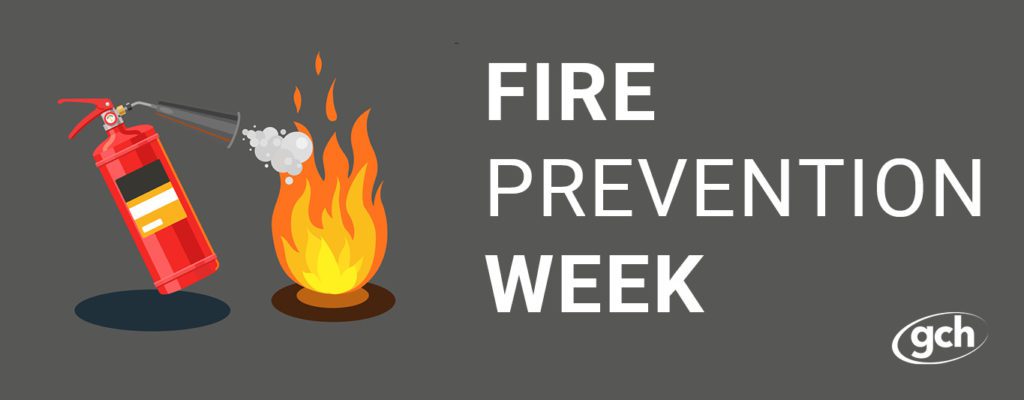
Fire Prevention Week
Most fires in the home can be prevented, by taking some basic and common-sense precautions. This page will help know what to look out for in your home when it comes to preventing a fire.
A fire can start anywhere in the home so early detection is vital. Fitting the appropriate alarms, knowing what to look out for and an creating an escape plan is your best defence against fire.
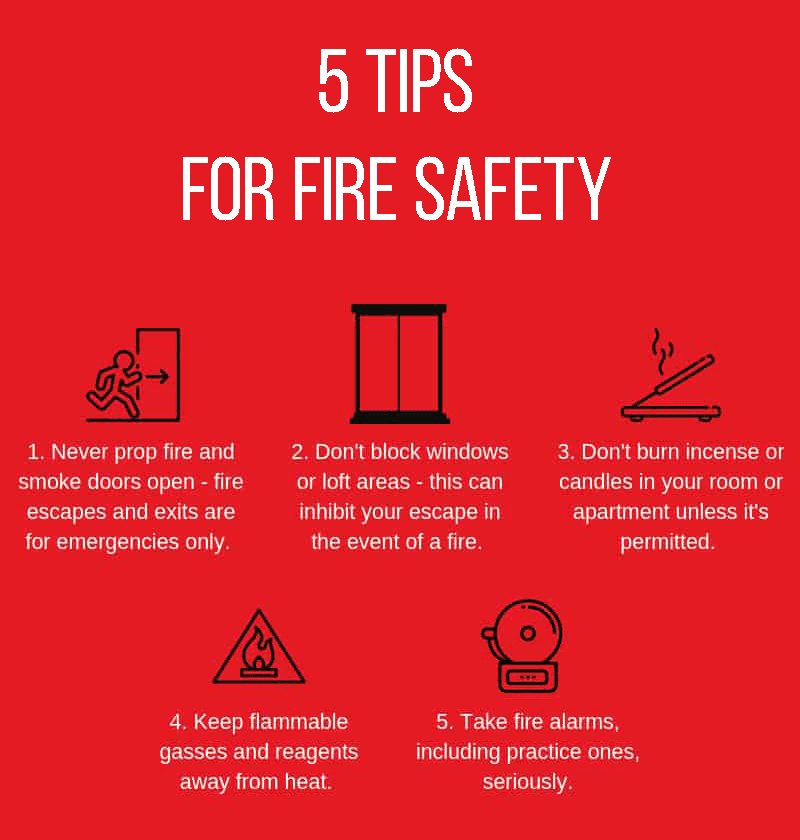
Did you know…?
- You’re around eight times more likely to die in a fire if you do not have a working smoke alarm in your home.
- Around half of home fires are caused by cooking accidents.
- Two fires a day are started by candles.
- Every six days someone dies from a fire caused by a cigarette.
- About three fires a day are started by heaters.
- Faulty electrics (appliances, wiring and overloaded sockets) cause around 4,000 fires in the home across the country every year.
General advice regarding FIRE SAFETY
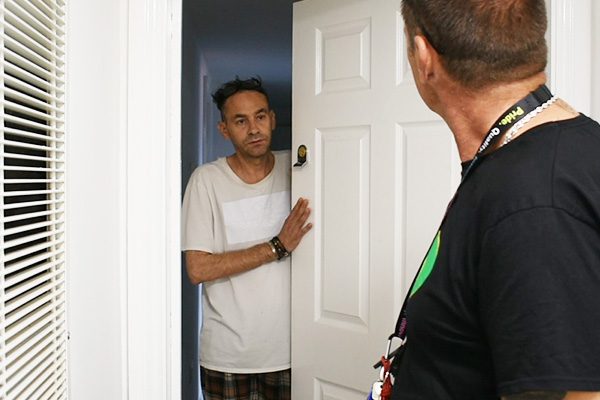
At Home
1. Never smoke in bed or whilst lying down, always smoke when alert and if possible, outside.
2. Never leave cooking unattended or leave anything on top of your cooker.
3. Take care with your clothing as loose sleeves and long clothing easily catch fire when cooking or near heaters.
4. Keep your exit routes and main walkways clear.
5. Do not use chip pans, use a deep fat fryer.
6. Extinguish candles safely before going to bed and use appropriate holders. Do not place them on top of your TV.
7. Keep all heating sources clear of clutter and take care near heaters.
8. Close your bedroom door whilst sleeping to prevent a fire from spreading.
9. Never leave items on charge overnight or for lengthy periods.
10. Plug-in air fresheners can present a risk of fire and it is recommended that you do not use them.
11. Always keep your cooker and extractor fan clean.
12. Keep secondary exits in your home clear of furniture.
13. We actively discourage the use of polystyrene tiles in our homes because older types of these tiles can give off poisonous fumes if they catch fire and may spread fire quickly to other parts of the property
14. Ensure that your furniture has fire safety labels.
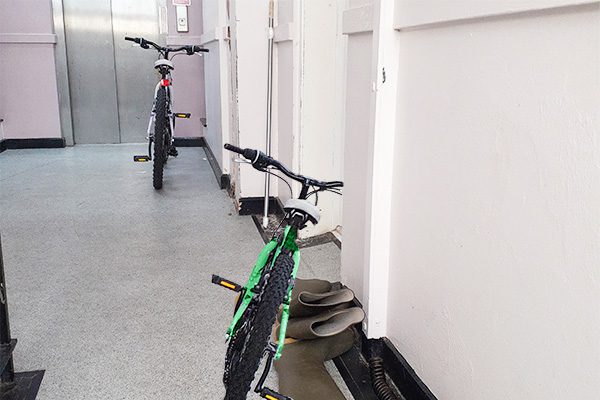
In Communal Areas
Keep communal staircases, under stair cupboards, landings and corridors free from rubbish or hazards at all times. They provide access for emergency services in the event of a fire and an escape route for the safe evacuation of residents.
Items left in stairwells or corridors could become a hazard, particularly in the event of a fire if the area were smoke-filled or in darkness.
Residents living in blocks of flats with communal areas have a responsibility to keep the corridors, landings, stairwells and under-stair cupboards clear at all times. These are not areas for storage of personal items, furniture or bags of rubbish awaiting disposal.
The following items should not be stored or placed in communal areas:
• Bikes or motorbikes
• Prams, buggies or pushchairs
• Children’s toys, bikes and scooters
• Recycling boxes, bags or bins
• Furniture, tables, cupboards or chairs
• Black bin bags and general rubbish
• Mobility scooters or other walking aids
Fires in your garden
As your landlord, we would prefer that you don’t make fires on the property, however when it comes to having fires in your garden, it is more important to ensure you follow these simple steps to make sure you stay safe:
- Build the fire a safe distance away from the property or anything that could catch ablaze.
- Don’t burn large amounts of cardboard or paper, as this can float away and potentially start a fire elsewhere.
- Keep a fire bucket to hand.
- Only use as much wood as you need – don’t build the fire too big.
- Don’t use any flammable liquids on the fire.
- Keep the area around the fire free of flammable things and clutter.
- Keep any matches or lighters separate until it’s time to use them.
- Make sure that people aren’t wearing loose clothing such as scarves, and have their hair tied back when they’re close to the fire.
- Good behaviour around the fire will help keep people safe.
BBQ / Barbecues
A barbecue should be a safe and enjoyable experience but it’s all too easy to be distracted when you have friends and family around you whilst cooking. To avoid injuries or damage to property, follow these simple precautions:
- Make sure your barbecue is in good working order
- Ensure the barbecue is on a flat site, well away from a shed, trees or shrubs
- Keep children, garden games and pets well away from the cooking area
- Never leave the barbecue unattended
- Keep a bucket of water or sand nearby for emergencies
- Ensure the barbecue is cool before attempting to move it.
Charcoal Barbecues
- Use only enough charcoal to cover the base to a depth of about 50mm (2 inches)
- Only use recognised fire lighters or starter fuel and only on cold coals – use the minimum necessary and never use petrol
- Never put hot ashes straight into a dustbin or wheelie bin – they could melt the plastic and cause a fire.
Gas Barbecues
- Make sure the tap is turned off before changing the gas cylinder
- Change cylinders outdoors if possible or in a well-ventilated area
- If you suspect a leak to the cylinder or pipe work, brush soapy water around the joints and watch for bubbles – tighten to fix but do not overtighten
- After cooking, turn off the gas cylinder before turning off at the controls to ensure any residual gas in the pipe work is used up
Never use a BBQ, including disposable ones, indoors or on your balcony. Be careful where you position your BBQ – we suggest on level ground, well away from anything flammable like sheds, fences, trees or tents. Don’t use petrol, paraffin or any flammable liquids on your BBQ – firelighters are a much safer option.
Smoke alarms and fire detection
The best way to protect yourself from fire is to have a smoke alarm – it will give you an early warning of a fire in your home.
• Dust your smoke alarm regularly.
• Check your smoke alarm weekly to make sure it is working by pressing the test button.
• Replace the battery if the alarm bleeps for any reason other than smoke or fire in your home
• Don’t remove a working battery from your smoke alarm
• Don’t paint over or remove the smoke alarm.
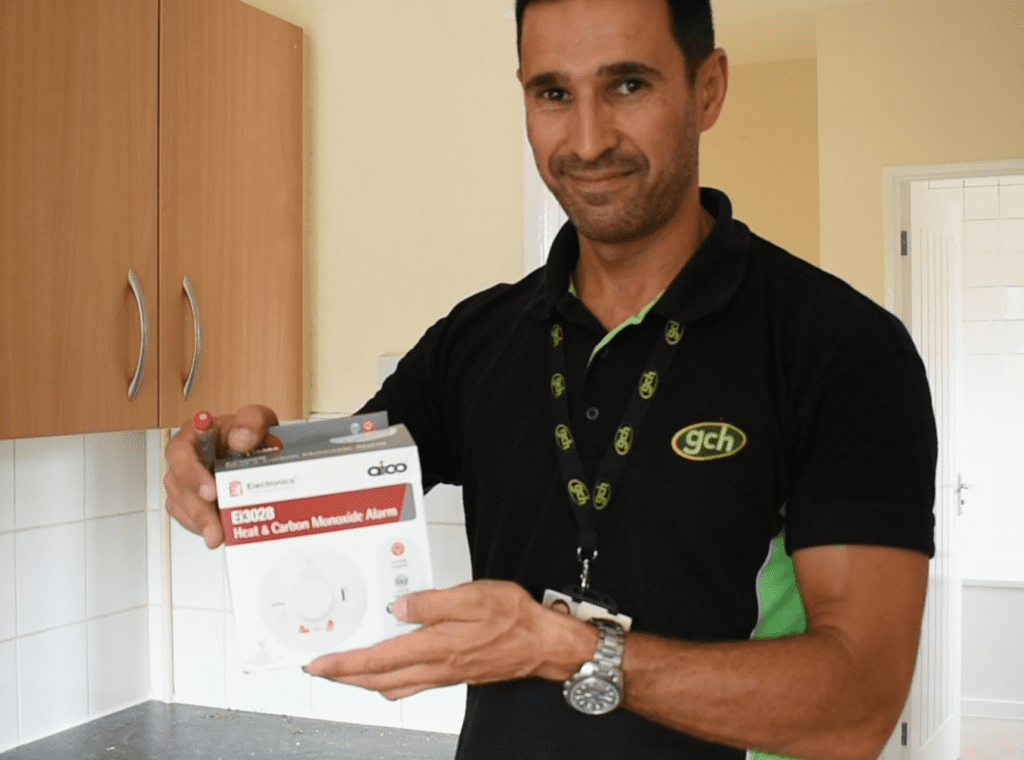
Contact us if you have any problems with your smoke alarm.
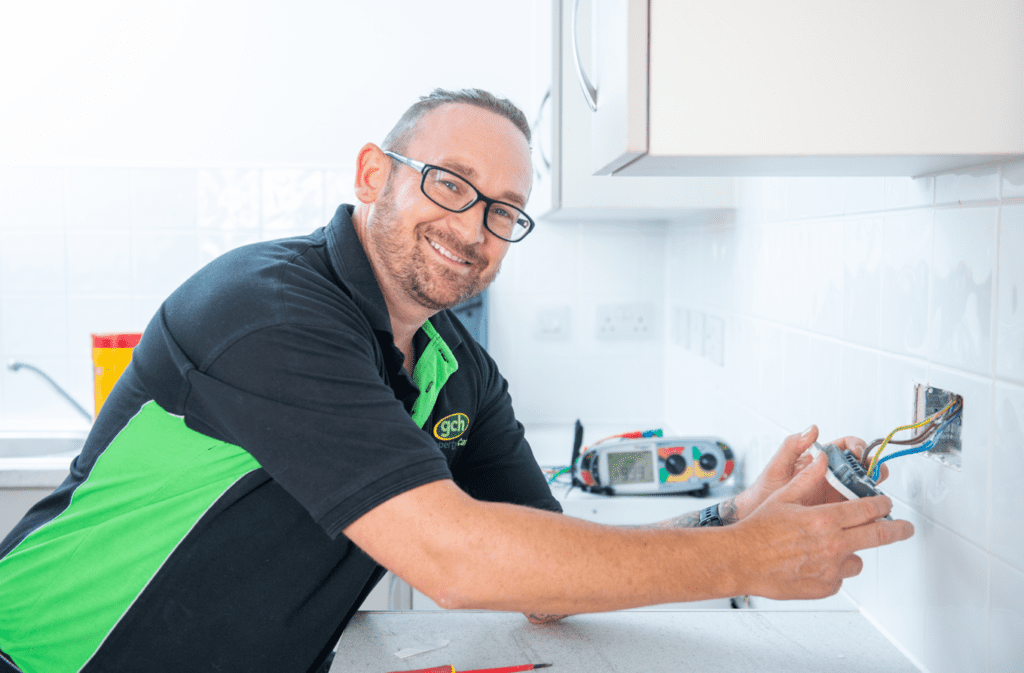
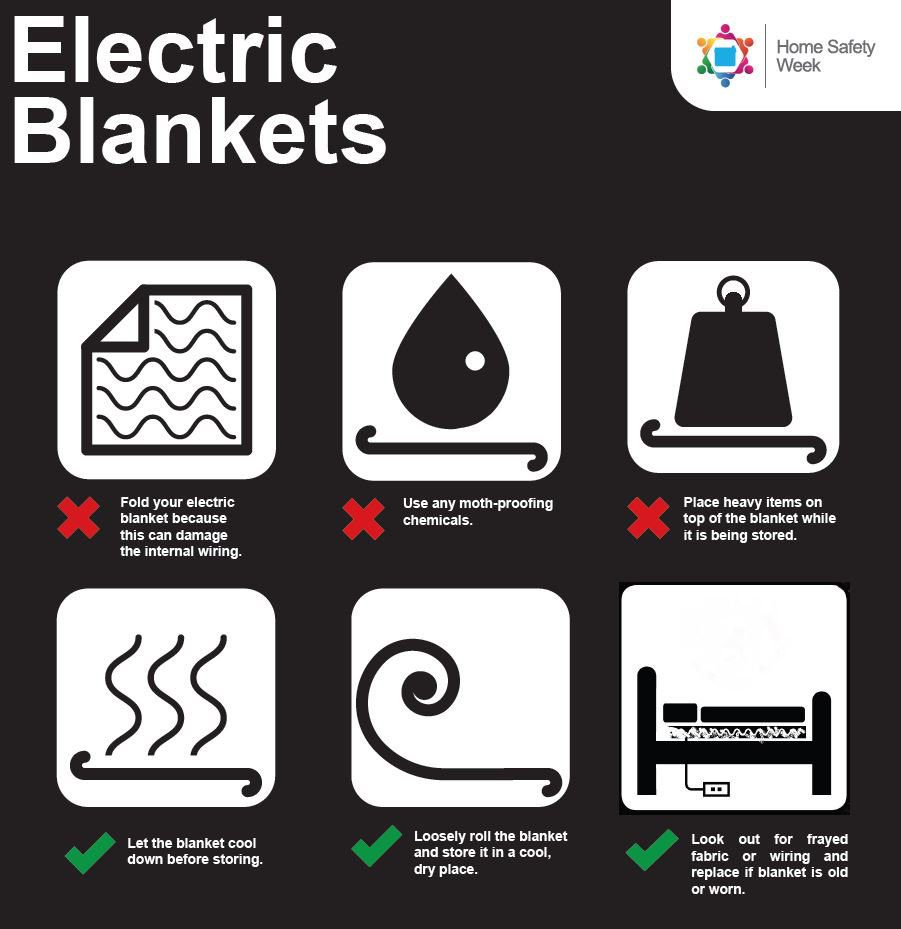
How to prevent common electrical fires
Many portable electric items like lamps and radios are supplied with a relatively short length of cable. Newer properties should have sufficient socket outlets at convenient points will minimise the need for extension leads and adapters, but occasionally their use will be unavoidable. When it comes to minimising the risk of an electrical fire in your home, follow these simple steps:
- Always check that you use the correct fuse to prevent your plug from overheating Make sure your electrical appliances have the British or European safety mark.
- Use one plug per socket rather than using adaptors or extension leads. High-powered appliances such as washing machines should always have a single plug and plug socket to themselves.
- Keep electrical appliances clean and in good working order to prevent them from causing a fire.
- Look for signs of dangerous or loose wiring such as scorch marks, hot plugs and sockets, flickering lights, fuses that blow or circuit breakers that trip for no obvious reason.
- Unplug appliances you are not using.
- Unplug electric blankets before going to bed if they do not have thermostatic control for safe all-night use.
- Try to secure portable heaters up against a wall to stop them from falling over.
- Keep portable heaters away from curtains and furniture and never use them for drying clothes.
- Replace electric blankets immediately if they show wear and tear.
Do Not
Overload an extension lead or adaptor
Fold electric blankets or buy second-hand electric blankets.
How to prevent common kitchen fires
Ensuring your kitchen is safe can be tricky business in a busy household, but following these common-sense tips should help keep you and your family safe:
- Keep matches and saucepan handles out of children’s reach and do not let saucepan handles stick out from the cooker where they could be easily knocked off.
- Take the pans off the heat or turn down the heat under the pans if you have to leave the kitchen whilst cooking.
- Keep tea towels and cloths away from the cooker
- Use spark devices rather than matches or lighters to light gas cookers because they do not have a naked flame.
- Double check the cooker is off when you have finished cooking.
- Keep electrical leads and appliances away from water.
- Keep toasters clean and away from curtains and kitchen rolls.
- Keep your cooker clean and free from fat and grease.
- Use a thermostat-controlled electric deep-fat fryer, which cannot overheat rather than hot oil in a saucepan which can easily overheat and catch fire.
What to do if there is a fire?
Different types of accommodation have different guidance from the National Fire Chiefs Council and our Fire Risk Assessors when it comes to staying put or evacuation.
When you moved into your home, you would have been provided with specific advice relating to your block and the policy GCH currently applies to it. The table below details the type of policy applied to the type of property.
- Purpose-built non-Sheltered Housing Stay Put
- Sheltered Schemes: Stay Put
- Homeless Accommodation including HMO: Simultaneous Evacuation
- Converted Blocks of Flats (not purpose-built): Assessed on a case-by-case basis
- General Needs dwellings: Simultaneous Evacuation

Stay Put Policy
- Stay in your home and close all doors behind you. Move towards a window, so that you can be seen from the outside.
- Get ready to be evacuated e.g., get dressed, collect walking sticks, house keys etc.
- Wait for the Senior Fire Officer to decide when to evacuate the building. They will have a list of all the residents who need help.
- If you are in a communal area, leave by the safest route
Do Not - Use the lift – as these will not work while the fire alarm is sounding.
- Let visitors through the communal door entry system unless they are emergency personnel needing to get into the building.
- Leave your home until told that it is safe to do so.
- Go out into the corridors to investigate.
- Block corridors – keep escape routes clear at all times.
Simultaneous Evacuation
- When a fire alarm sounds or you identify a fire, exit your home by the safest route, beyond the building
- If you are in a communal area of a block, leave by the safest route
- Call the Fire Service to notify them of the fire. NB: You should familiarise yourself with the layout of the building and ensure that you understand exit routes and safe locations beyond the building
- If you live in a block, do not use the lift – as these will not work while the fire alarm is sounding.
- If you live in a block, do not let visitors through the communal door entry system unless they are emergency personnel needing to get into the building.
Do Not

